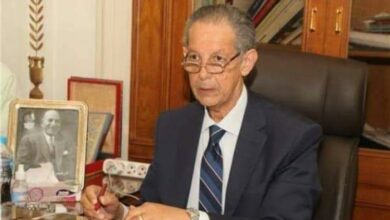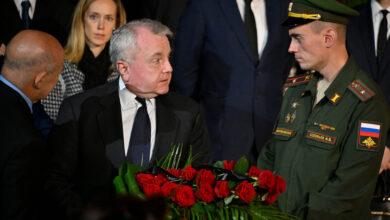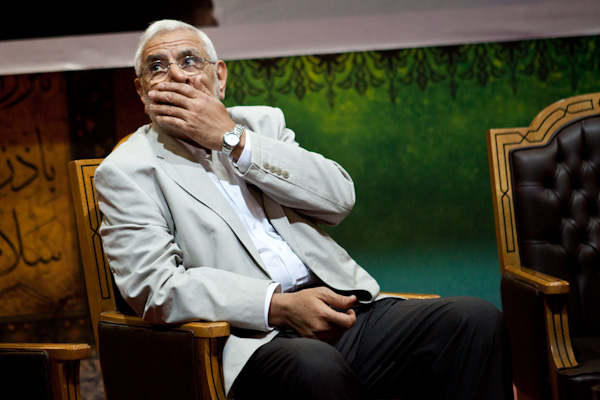The left wing of Egyptian politics boasts some of the most notable figures of the revolution, including political intellectuals, human rights activists and whistle-blowing online activists who have for years helped move the debate and public consciousness in Egypt toward the need for integral change.
But when it has come to formal politics, the left’s influence has been decidedly more limited. Of the 508 seats in the People’s Assembly, leftist parties claim a mere eight elected seats. The largest leftist party, the Socialist Popular Alliance Party, won seven of those, having only been approved as a political party a few weeks before the first stage of the elections.
On 10 March, the door for individuals to officially nominate themselves as presidential candidates will open. The prospects of leftist parties winning a successful nationwide election may be limited if they rely on only their own resources and constituency base.
The Socialist Popular Alliance Party, which is the largest leftist party, along with the Egyptian Socialists, the Communist Party, the Tagammu Party and the Union of Socialist Youth have been meeting recently to decide on a candidate they can back or field in the coming elections. Each party is set to make its proposition by next week.
Non-leftist candidates, such as former leading Muslim Brotherhood leading Abdel Moneim Abouel Fotouh, and previously Mohamed ElBaradei, have emerged as potential outsiders that the left could back. Recently prominent names from within leftist politics, such as Popular Alliance MP Abul Ezz al-Hariry and lawyer Khaled Ali, have also been suggested. Ali, a prominent lawyer in social justice and anti-corruption cases, will officially announce his candidacy on 27 February.
“At this point, the left cannot field anyone that can provide the correct mixture of an agenda, a solid constituency backing, charisma and financial resources,” said Mostafa Kamel al-Sayed, a political science professor at Cairo University and member of the Popular Alliance.
The “radical” proposition
Until 12 February, Abul Ezz al-Hariry was presented as a possible candidate for the left, who other secularists might be able to get behind.
Hariry has the advantage of being known and visible. As one of the founders of the Popular Alliance, he wields significant leverage in the left, and his history of social and political activism make him an obvious choice. However his age, 64, and health may be an impediment to him campaigning around the country, a requirement for running in the presidential election, said Marwa Farouk, a member of the Popular Alliance.
Some workers unions and youth revolutionary groups have already began campaigning for a candidate from within the leftist encampment, Khaled Ali. As a director of the Egyptian Center for Social and Economic Rights, Ali has been at the forefront of anti-corruption cases as an almost omnipresent figure in court hearings in recent years.
“Khaled Ali is the candidate who would be able to bring the more radical calls for reform into action,” said Gamal Eid, another prominent leftist lawyer and the director of the Arab Network for Human Rights Information.
Ali’s program may focus on certain points, such as dropping Egypt’s foreign debts, social equality, legally restoring public property that was corruptly sold off during Mubarak’s regime, and taking a more steadfast opposition to the Israeli occupation, according to Eid.
Eid, who is working on the campaign, said that a group of activists and labor workers have already began campaigning for Ali, who will officially announce his candidacy at the Journalist’s Syndicate on 27 February. On 26 February, he turns 40, the minimum age for candidacy.
But no party has yet endorsed Ali, and his lack of experience as a politician worries some. Eid believes that his experience in court and popularity among laborers and activists is a good starting point.
Socialist Popular Alliance Party and Egyptian Socialists members told Egypt Independent that backing Ali’s candidacy is being seriously considered in their meetings.
“Up until now, the situation is unclear. Khaled may be our choice. Some are proposing a potential partnership between Khaled Ali and Abouel Fotouh [where Ali can run as his deputy],” Farouk said.
A little to the left?
Besides needing a candidate who would fight for social justice, the leftist parties have had loose criteria on just how far to the left the candidate they back needs to be.
“The candidate does not have to be from the left, he just has to have an agenda the left can agree with,” said Karima al-Hefnawy, a member of the Egyptian Socialist Party.
Most importantly, the candidate must have an economic agenda that espouses a fundamental inclination towards social justice. Some, such as Hefnawy, argue that the revolution and the previous elections have inherently affected public consciousness and opened them up to alternate economic models.
But in addition to finding someone who shares their economic vision, leftist forces want a candidate who intends to stand up to the country’s two major powers: the Supreme Council of the Armed Forces and the Muslim Brotherhood.
“Whoever we choose to back, we must make sure we are uncompromising politically,” said Farouk.
The left’s candidate must essentially be someone who aptly fits into their continuing adherence to the revolution’s principles. Many thought Mohamed ElBaradei, former head of the UN Nuclear watchdog and a longtime advocate for political change, who describes himself as a social democrat, would have been the choice of many in the left. ElBaradei withdrew from the race in mid-January, saying a legitimate election couldn’t be held under the SCAF’s watch, leaving many of those from the left who might have voted for him unclear on who to choose.
“Many of the young revolutionary voters looked to Abouel Fotouh after ElBaradei,” Hefnawy said. Abouel Fotouh, a former Muslim Brotherhood leader who left the group last summer, may be an unlikely choice some leftists, who would normally not back an Islamist.
But his economic program, which focuses on certain elements of redistribution of wealth, as well as his opposition to the Brotherhood’s political activity and the continued presence of SCAF in power make him a likely choice for revolutionary forces, of which leftist parties are an integral part.
An endorsement of Abouel Fotouh may offer him easier access to labor unions and offer him a certain degree of credibility regarding his stance on social justice. Meanwhile, the left could gain the allegiance of the man who has publicly lauded some of the socialist policies enacted by Gamal Abdel Nasser.
Betting on unity
In less than a week, it will have become clear whether leftist parties will decide on a unified stance on who to back in the presidential elections. A unified stance may make up for their relatively small base of supporters.
“There is always the possibility that there are differing opinions between our parties when it comes to election time,” Farouk said.
“It is important to us that we do not break up the leftist vote; we hope that we can all agree on someone whether he’s from within (leftist) ranks or from the outside,” Hefnawy said.
If the vote is broken up and the left fields multiple candidates, their performance in parliamentary elections might suggest that they do not have a chance, and that they may be running for the sake of promoting leftists principles in the elections.
Others however, are in it to win. “Khaled Ali is a real candidate, and we are not in the elections only to raise certain issues,” Eid said.




